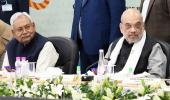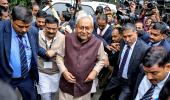Sources within the INDIA bloc said appointing Nitish Kumar as convenor would lend credibility to the INDIA bloc's demand for conducting a nationwide caste census.

The Janata Dal-United is optimistic about the INDIA bloc of parties announcing Bihar Chief Minister Nitish Kumar as convenor of the Opposition alliance, with most of its constituents, particularly the Congress, amenable to his appointment.
The Indian National Developmental Inclusive Alliance (INDIA) is set to make several key decisions in the lead-up to Congress leader Rahul Gandhi's two-month-long Manipur-to-Mumbai Bharat Nyaya Yatra, commencing on January 14.
These decisions are likely to include declaring Nitish Kumar as convenor of the alliance and finalising seat-sharing agreements in crucial states, such as Bihar and Maharashtra.
Last week, on December 19, Nitish Kumar assumed the role of JD-U president.
The Congress leadership has since reached out to him, committing itself to backing him as convener of the alliance and persuading other leaders to come on board in recognition of the crucial role that the Bihar CM has played since February 2023 in shaping the bloc.
At a meeting of the Communist Party of India-Marxist-Leninist in Patna on February 18 last year, Nitish Kumar and the Congress's Salman Khurshid, dispatched by party President Mallikarjun Kharge, initiated consultations to form an Opposition alliance for the 2024 Lok Sabha polls. This led to the alliance's top leaders holding their inaugural meeting in Patna in June.
Sources within the INDIA bloc said that appointing Nitish Kumar as convenor would lend credibility to the INDIA bloc's demand, particularly that of Rahul Gandhi, for conducting a nationwide caste census. The Bihar government conducted a caste survey and made the details public in 2023.
Meanwhile, the Congress's five-member alliance committee is diligently working to finalise seat-sharing agreements in Maharashtra and Bihar. However, progress has been elusive in Punjab.
The state units of the Aam Aadmi Party and the Congress have resisted any seat-sharing between the two, arguing that it would be illogical to unite against the Bharatiya Janata Party in the state, where the latter is fourth in terms of vote percentage. The BJP's influence is confined to Hindu pockets in Punjab's urban areas.












 © 2025
© 2025